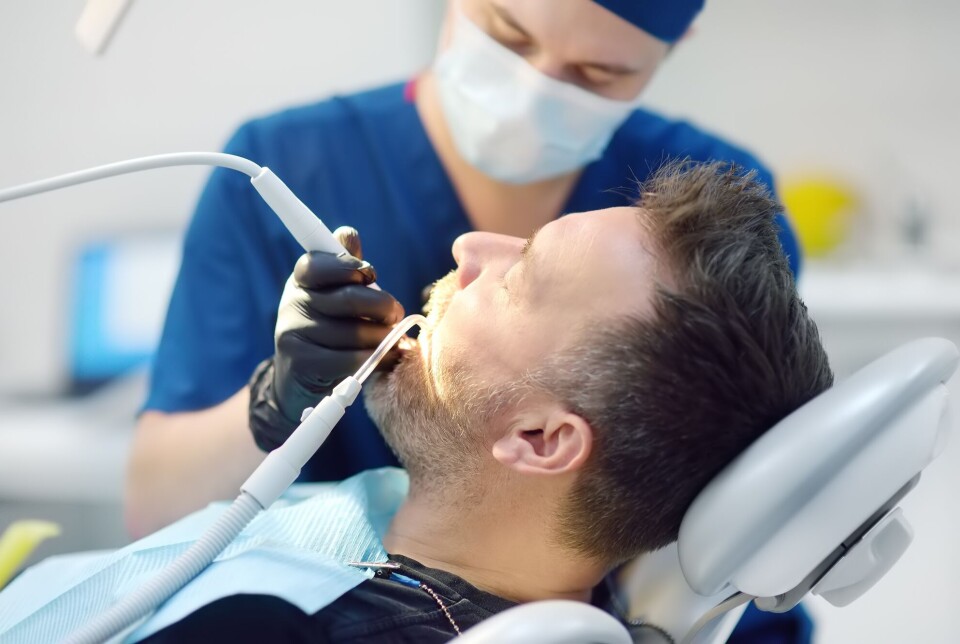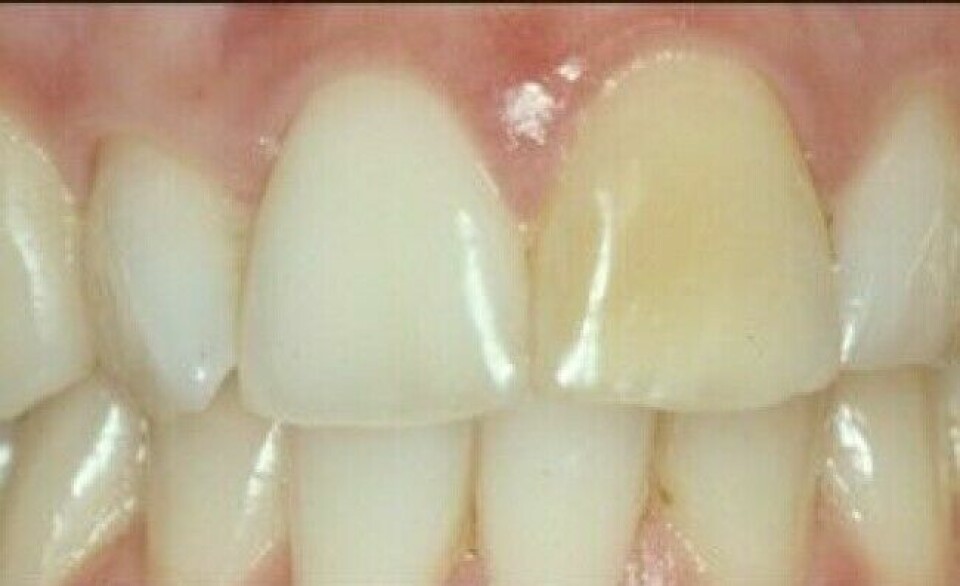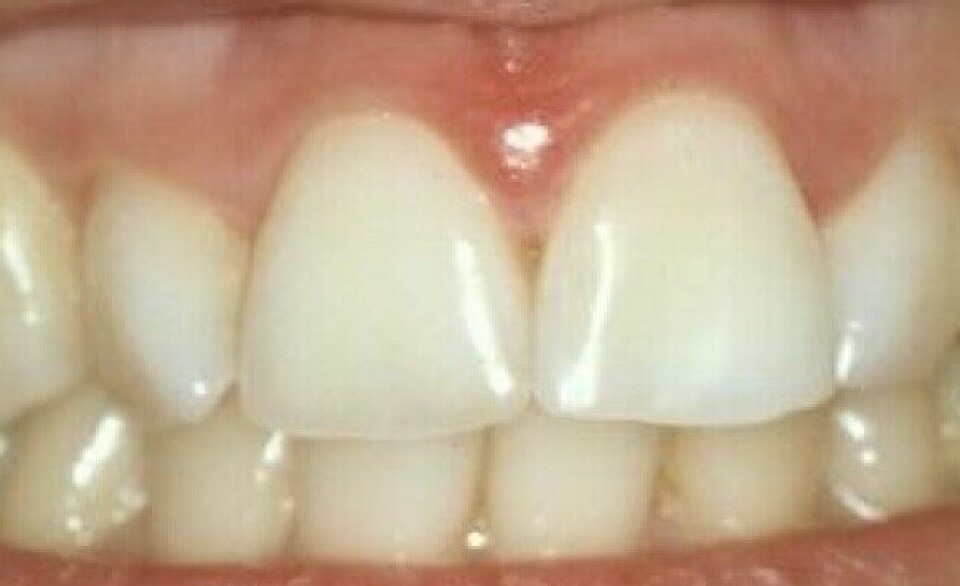
Dentists claim that people often have unrealistic expectations about how white their teeth should be
“We’re not part of the cosmetics industry,” dentist Line Bjerklund Pedersen says.
Senior researcher Aida Mulic, who works at the Nordic Institute of Dental Materials (NIOM), notes that there are individuals who desire extremely white teeth, even though it doesn’t look natural.
Mulic is one of several dentists and researchers who have been concerned about this in recent years.
Like veteran dentist Kari Sunniva Elde, who spoke about the trend with forskning.no in 2022 (link in Norwegian).
“A new tooth colour has emerged due to people over-bleaching. It’s unfortunate,” she said.
Both young and old now have ‘skimmed milk-white’ teeth with a bluish tint, Elde points out.
Norwegian Broadcasting Corporation NRK also reported on the issue last year (link in Norwegian).
Dentists should not whiten teeth
“I don't think teeth whitening is something we should be doing,” Line Bjerklund Pedersen tells sciencenorway.no.
In addition to being head of the ethics committee of the Norwegian Dental Association (NDA), she also runs a private practice where she does not offer whitening, except in cases where a patient has a specific dental damage or condition.
“You imply that the patient’s teeth aren’t white enough when you offer teeth whitening,” Pedersen says.
“Isn't it better for the patient to get professional whitening at a dentist’s office if there’s a risk that they might do it themselves?”
Most viewed
“No, because then I’m confirming that whitening is something we should be doing,” she says.
Dentists who are members of NDA must adhere to the association's ethical guidelines (link in Norwegian), which are clear on this matter.
A significant ethical dilemma
Aida Mulic, who also works as a dentist, has experienced challenging decisions in her practice. There are instances where she thinks a patient’s teeth should not be whitened. The patient counters by saying that they will go to another dentist if they do not get their way.
“Maybe it would be better and gentler if I do it,” she has sometimes thought.
The best thing she can do is to inform her patients as well as possible.
“I can advise against it. I have professional integrity and shouldn’t be influenced by the patient. Ultimately, it’s the patient's best interests that we as dental health professionals should look after,” she says.
Should not create a need for treatment
Mulic still sees it is an ethical dilemma.
“This doesn't just apply to teeth whitening, but other issues as well,” Mulic says.
Some people have nice, healthy teeth but still want to grind them down and put on veneers.
Mulic is clear that dentists should not recommend whitening if patients do not mention it themselves.
“We should not create a need for treatment,” she says.
Natural change
Many people benefit from teeth whitening, Mulic admits in this article. But teeth whitening is a treatment, and a treatment should always be based on a diagnosis.
Mulic believes that more people should embrace their natural tooth colour.
"The colour of our teeth will change over the course of our lives," Mulic says.
The enamel, the outer layer of the tooth, gradually wears away with age. Brushing, chewing hard food, and acidic drinks cause the enamel to gradually wear down.
The dentine, the actual tooth bone beneath the enamel, has a yellower colour. This becomes more visible as the enamel thins.
On many patients, Mulic believes a natural tooth colour looks better than an extremely white colour.
“The colour of our teeth often harmonises with the other colours in our face,” she says.


Few inquiries
The NDA’s ethics committee advises on ethical questions and handles cases where patients report violations of the ethical guidelines.
“Unfortunately, very few feel overtreated when it comes to teeth whitening,” Pedersen says.
She wishes more patients were critical. The inquiries that come are mostly from colleagues reacting to unprofessional marketing.
A new standard that isn’t real
Pedersen believes part of the solution is to completely shift the focus away from teeth whitening.
She recently had a patient who thought her teeth were too yellow. The patient was examined and, in Pedersen's opinion, had nice, white teeth. There was some plaque and tartar between the teeth which was brushed away.
After a clean and a discussion about what normal tooth colour actually is, the patient looked in the mirror and was satisfied with her tooth colour.
Not part of the cosmetics industry
“Society has set a new standard for what white teeth are, which isn’t real. It’s not our agenda to confirm that to people,” Pedersen believes. “People trust that what we do is in their best interest.”
She emphasises that the role of dental health professionals is to prevent and treat dental and oral diseases.
“We are not part of the cosmetics industry,” she says.
Pedersen believes dentists, instead of whitening, should educate their patients about brushing and flossing, and talk about how to avoid plaque on their teeth in the first place.
“All food that has colourants, like coffee, tea, and blueberry jam, can cause discolouration. But this discolouration can often be polished away,” Mulic says.
Regular visits to the dentist for teeth cleaning and using a polishing toothpaste can be very effective in maintaining dental hygiene, she adds.
Grandchildren comment on yellow teeth
The desire for white teeth is becoming increasingly common.
“We’ll do almost anything to maintain a youthful appearance, and teeth are no exception. It’s very unfortunate that we don’t accept completely normal signs of ageing,” Pedersen says.
She mentions frequent requests from older people who want teeth whitening.
“Especially women, but also men over 70,” Pedersen says.
It may be that a friend has gotten white teeth, often porcelain crowns. In other cases, their grandchild has remarked that their teeth are not white.
“It creases a need and a fashion. It’s very unfortunate,” she says.
Moreover, it is difficult to whiten teeth that change colour with age.
Still, it’s mostly young people who ask for teeth whitening.
“Appearance is fashion, and people are not averse to doing irreversible procedures to follow trends. It’s a very dangerous development that healthcare personnel should not be a part of.”
———
Translated by Alette Bjordal Gjellesvik
Read the Norwegian version of this article on forskning.no





































